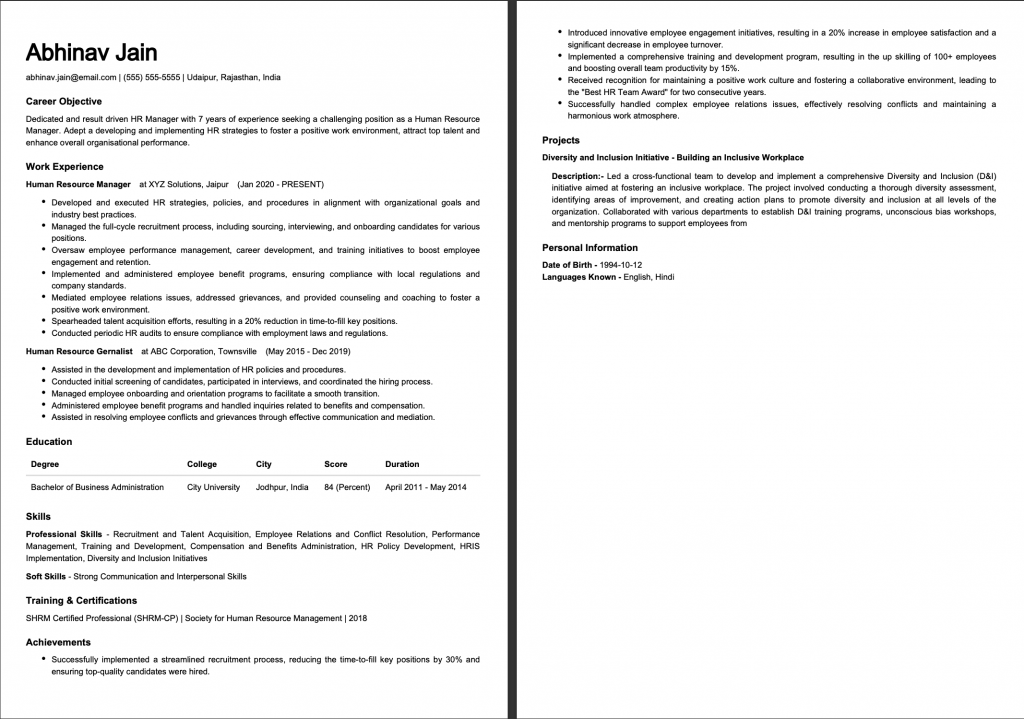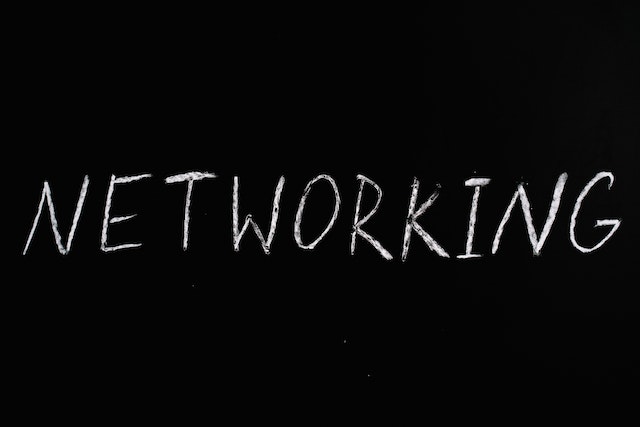How to Write an HR Manager Resume That Gets You Hired
By end of this you”ll know
Understanding the Role of an HR Manager
Let’s explore the key responsibilities and functions of an HR manager in an organisation.
Human resources (HR) is a vital function in any organisation. HR managers are responsible for managing the people aspect of the organisation, ensuring that the employees are aligned with the organisation’s goals, values and culture. HR managers also play a key role in attracting, developing, retaining and motivating the talent that drives the organisation’s success.
Some of the main responsibilities and functions of an HR manager are:
- Recruitment and selection: HR managers oversee the process of hiring new employees, from defining the job requirements, sourcing and screening candidates, conducting interviews, making offers and onboarding the new hires.
- Training and development: HR managers design and implement training and development programs that help employees acquire new skills, enhance their performance and advance their careers. HR managers also evaluate the effectiveness and impact of these programs on the organization’s objectives.
- Performance management: HR managers monitor and assess the performance of employees, providing feedback, coaching and recognition. HR managers also handle performance issues, such as underperformance, misconduct or grievances, and take appropriate actions to resolve them.
- Compensation and benefits: HR managers develop and administer the compensation and benefits policies and practices that reward and retain employees. HR managers also ensure compliance with legal and regulatory requirements, such as minimum wage, overtime pay, taxes, insurance and pensions.
- Employee relations: HR managers foster a positive and productive work environment, where employees feel valued, respected and engaged. HR managers also handle employee complaints, conflicts and disputes, and mediate between employees and management when needed.
- Organizational development: HR managers support the organization’s strategic planning, change management and culture initiatives. HR managers also analyze the organization’s structure, processes and systems, and propose improvements to enhance efficiency, effectiveness and innovation.
Essential Skills for HR Managers
Highlighting the core skills and competencies that HR managers need to excel in their roles.
HR managers are responsible for overseeing the human resources functions of an organization, such as:
- Recruitment
- Training
- Performance management
- Employee relations
- Compliance
They also play a strategic role in aligning the human capital with the organisational goals and culture.

To succeed in this challenging and rewarding role, HR managers need to develop and demonstrate a range of skills and competencies, such as:
- Communication: HR managers need to communicate effectively with different stakeholders, such as employees, managers, senior leaders, external partners, and regulators. They need to be able to listen actively, convey clear and concise messages, adapt their communication style to the audience and situation, and use various communication channels and tools.
- Leadership: HR managers need to lead by example and inspire others to follow their vision and values. They need to be able to motivate and empower their teams, delegate tasks appropriately, provide feedback and recognition, resolve conflicts, and foster a positive and inclusive work environment.
- Business acumen: HR managers need to understand the business context and objectives of their organisation, as well as the industry trends and best practices. They need to be able to analyse data and metrics, identify opportunities and challenges, propose solutions and recommendations, and measure the impact of their initiatives on the business outcomes.
- Critical thinking: HR managers need to think critically and creatively about complex and ambiguous issues that affect the human resources function. They need to be able to evaluate information from multiple sources, question assumptions, identify biases, generate alternatives, and make informed decisions.
- Ethical conduct: HR managers need to uphold the highest standards of ethical conduct and professionalism in their work. They need to be trustworthy, respectful, fair, transparent, and accountable for their actions. They also need to ensure compliance with the relevant laws, regulations, policies, and codes of conduct.
Human Resources (HR) Manager Role and Career
If you are interested in working with people, managing talent, and developing organizational culture, you might want to consider a career as a human resources (HR) manager.
HR managers are responsible for planning, directing, and coordinating the administrative functions of an organization. They oversee the recruitment, training, compensation, performance evaluation, and employee relations of the staff. They also ensure compliance with labor laws and regulations, and handle any issues or disputes that arise among employees or between employees and management.
To become an HR manager, you typically need a bachelor’s degree in human resources, business administration, or a related field. Some employers may prefer candidates with a master’s degree in human resources or a specialized certification, such as the Professional in Human Resources (PHR) or the Senior Professional in Human Resources (SPHR) credentials.
You also need to have relevant work experience in human resources or a related field, such as recruitment, training, or employee relations. Depending on the size and structure of the organization, you may need to have experience in a specific area of human resources, such as benefits administration, payroll, or labor relations.
As an HR manager, you can expect to earn an average salary of $121,220 per year, according to the Bureau of Labor Statistics (BLS). The salary range may vary depending on factors such as the industry, location, and size of the organization. The BLS also projects that the employment of HR managers will grow by 6% from 2019 to 2029, faster than the average for all occupations. This is due to the increasing demand for skilled and qualified workers in various sectors, as well as the need for HR managers to handle the complex legal and regulatory issues related to employment and labor.
A career as an HR manager can be rewarding and challenging, as you will have the opportunity to shape the culture and performance of an organization. You will also have to deal with various stakeholders, such as employees, managers, executives, unions, and government agencies. You will need to have strong communication, interpersonal, leadership, and problem-solving skills to succeed in this role. You will also need to be adaptable, flexible, and ethical, as you will face changing situations and dilemmas on a regular basis.
If you are passionate about human resources and want to advance your career as an HR manager, you can take advantage of various resources and opportunities to enhance your skills and knowledge. You can join professional associations such as the Society for Human Resource Management (SHRM) or the International Association for Human Resource Information Management (IHRIM), which offer networking events, conferences, webinars, publications, and certification programs. You can also enroll in online courses or programs that cover topics such as strategic human resource management, employee engagement, diversity and inclusion, organizational development, and labor law. You can also seek mentorship from experienced HR managers who can offer guidance and advice on your career path.
Becoming an HR manager can be a fulfilling and rewarding career choice for anyone who wants to make a positive impact on an organisation and its people. If you are interested in pursuing this career path, you can start by exploring the educational requirements, job duties, salary expectations, and growth prospects of this role. You can also look for opportunities to gain relevant experience and exposure in human resources or a related field. By doing so, you will be able to prepare yourself for the challenges and opportunities that await you as an HR manager.
HR Manager Career Progression
If you are interested in becoming a human resources (HR) manager, you might be wondering what steps you need to take to achieve your career goal. here, we will outline the typical career progression for an HR manager, as well as some tips and advice on how to advance in this field.

What are the typical career steps for an HR manager?
The career progression for an HR manager may vary depending on the size, structure, and industry of the organization they work for. However, a general career path for an HR manager could look something like this:
- HR assistant: This is an entry-level position that involves performing administrative tasks and supporting the HR department. Some of the duties of an HR assistant may include updating employee records, processing payroll, scheduling interviews, conducting background checks, and answering inquiries from employees or applicants.
- HR specialist: This is a mid-level position that involves performing specialized tasks in one or more areas of human resources, such as recruitment, training, compensation, benefits, or labor relations. Some of the duties of an HR specialist may include sourcing and screening candidates, designing and delivering training programs, administering compensation and benefits plans, managing employee grievances, or ensuring compliance with labor laws.
- HR generalist: This is a senior-level position that involves performing a variety of tasks across different areas of human resources. Some of the duties of an HR generalist may include overseeing the recruitment process, developing and implementing policies and procedures, conducting performance appraisals, managing employee relations issues, or coordinating employee engagement activities.
- HR manager: This is a managerial position that involves overseeing the human resources department and leading a team of HR professionals. Some of the duties of an HR manager may include setting goals and strategies for the HR department, managing budgets and resources, evaluating the effectiveness of HR programs and practices, providing advice and guidance to senior management on human resources matters, or representing the organization in external forums or negotiations.
- HR director: This is an executive position that involves directing the overall human resources function of an organization. Some of the duties of an HR director may include developing and executing the human resources vision and mission, aligning human resources objectives with organizational goals and values, establishing and maintaining relationships with key stakeholders, ensuring compliance with legal and ethical standards, or leading organizational change initiatives.
How can you advance your career as an HR manager?
If you want to advance your career as an HR manager, here are some tips and advice that might help you:
- Gain experience: One of the best ways to improve your skills and knowledge as an HR manager is to gain experience in different areas and levels of human resources. You can seek opportunities to take on new challenges and responsibilities, work on cross-functional projects, or rotate to different departments or locations within your organization. You can also look for external opportunities to expand your network and exposure, such as joining professional associations, attending conferences or seminars, or volunteering for community or social causes.
- Pursue education: Another way to enhance your qualifications as an HR manager is to pursue further education or certification in human resources or related fields. You can enroll in a master’s degree program, a certificate program, or a short course that covers topics such as strategic human resources management, organizational development, leadership, diversity and inclusion, or analytics. You can also obtain a professional certification from a reputable organization, such as the HRCI, the Society for Human Resource Management (SHRM), or the International Association for Human Resource Information Management (IHRIM).
- Seek feedback: A third way to advance your career as an HR manager is to seek feedback from your managers, peers, subordinates, and customers on your performance and areas of improvement. You can ask for regular performance reviews, 360-degree feedback, or informal feedback from your colleagues or mentors. You can also conduct self-assessments and reflect on your strengths and weaknesses, as well as your goals and aspirations. You can then use the feedback to create a personal development plan and take action to improve your skills and competencies.
HR Manager Job Openings & Salary Expectations
Human Resources (HR) Manager – Job Openings & Salary Expectations across countries –
According to the U.S. Bureau of Labor Statistics, the median annual wage for HR managers in 2020 was $121,220. The highest 10 percent earned more than $208,000, while the lowest 10 percent earned less than $69,160. The employment of HR managers is projected to grow 6 percent from 2019 to 2029, faster than the average for all occupations.
The salary and job outlook for HR managers may vary depending on the industry, location, and size of the organization. For example, according to Glassdoor,
the average base salary for HR managers in Canada was CA$78,000 in 2021.
The average base salary for HR managers in Germany was €66,000 in 2021.
The average base salary for HR managers in India was ₹1,200,000 in 2021.
If you want to explore the opportunities and challenges of working as an HR manager in different countries, you can check out some of the online resources below:
- Global HR Careers: This website provides information on HR jobs and careers around the world. You can search for jobs by country, region, sector, or function. You can also find articles and podcasts on global HR trends and best practices.
- International HR Forum: This blog offers insights and advice on international HR issues and topics. You can read posts from experts and practitioners on topics such as global mobility, talent management, diversity and inclusion, and cross-cultural communication.
- WorldatWork: This professional association provides education and certification programs for HR professionals who specialize in total rewards. Total rewards include compensation, benefits, work-life balance, recognition, performance management, and career development. You can join WorldatWork to access online courses, webinars, publications, events, and networking opportunities.
As you can see, becoming an HR manager can be a fulfilling and lucrative career choice. However, it also requires a lot of dedication, flexibility, and adaptability. You will need to keep up with the changing needs and expectations of your employees and your organization. You will also need to be aware of the cultural differences and legal regulations that affect your work in different countries.
If you are ready to take on the challenge and pursue your dream of becoming an HR manager, you can start by updating your resume and cover letter. You can also browse through some of the job openings on the websites mentioned above. Good luck with your job search!

Create HR Manager Resume with 1MillionResume.com
Are you looking for a way to create a stunning resume that showcases your skills and achievements?
Do you want to impress potential employers with a resume that stands out from the crowd?
If so, you should check out 1millionresume.com, the AI-powered resume builder that helps you craft a professional and personalised resume in under 30 minutes. Whether you are a fresh graduate, a seasoned professional, or a career changer, 1millionresume.com can help you create a resume that showcases your unique value proposition and gets you noticed by recruiters.
Job Openings and Salary Expectations in India
According to the latest data from Payscale, the average salary for an HR manager in India is ₹7,32,000 per year, which varies depending on the industry, location, experience, and skills of the candidate. The highest-paying industries for HR managers in India are information technology, banking, and manufacturing, while the lowest-paying industries are education, hospitality, and retail.
The demand for HR managers in India is expected to grow as the economy recovers from the impact of the COVID-19 pandemic and as more organizations adopt digital transformation and remote work models. According to Naukri.com, one of the leading job portals in India, there are currently over 25,000 job openings for HR managers across various sectors and locations in India.
To become an HR manager in India, one typically needs a bachelor’s degree in human resources management, business administration, psychology, or a related field, along with relevant work experience in HR functions. Some employers may also prefer candidates with a master’s degree or a professional certification in HR management. Additionally, an HR manager should have strong communication, interpersonal, leadership, analytical, and problem-solving skills.
HR Manager Resume Examples

If you are looking for a new job as an HR manager, you need a resume that showcases your skills and experience in the field. A well-written resume can help you stand out from the competition and land an interview with your desired employer. Here are some tips on how to write an effective resume for an HR manager position, along with an example to guide you.
Resume Summary
Start with a summary statement.
A summary statement is a brief introduction that highlights your main qualifications and achievements as an HR manager. It should capture the attention of the hiring manager and entice them to read more. For example:
Experienced and results-oriented HR manager with over 10 years of experience in managing employee relations, recruitment, performance management, and training. Skilled in developing and implementing HR policies and procedures, resolving conflicts, and fostering a positive work environment. Certified Professional in Human Resources (PHR) and member of the Society for Human Resource Management (SHRM).
List your core competencies
Core competencies are the key skills and abilities that you possess as an HR manager. They should be relevant to the job description and demonstrate your value as a potential employee. You can use bullet points to list your core competencies in a separate section or incorporate them into your summary statement or work experience sections. For example:
Core Competencies
- Employee Relations
- Recruitment and Selection
- Performance Management
- Training and Development
- HR Policies and Procedures
- Conflict Resolution
- Communication Skills
- Leadership Skills
Work Experience
Highlight your work experience. Work experience is the most important part of your resume, as it shows your track record of success as an HR manager. You should list your previous jobs in reverse chronological order, starting with the most recent one. For each job, include the name of the company, the location, the dates of employment, and your job title. Then, use bullet points to describe your main responsibilities and achievements, using action verbs and quantifiable results. For example:
Work Experience
ABC Company, New York, NY
HR Manager, January 2018 – Present
- Manage a team of 10 HR professionals and oversee all aspects of human resources functions for a company of 500 employees.
- Implement and update HR policies and procedures in compliance with federal, state, and local laws and regulations.
- Lead the recruitment and selection process, including posting job ads, screening resumes, conducting interviews, and negotiating offers.
- Design and deliver training programs for new hires, managers, and employees on topics such as orientation, diversity and inclusion, sexual harassment prevention, and performance appraisal.
- Coordinate employee relations activities, such as conducting investigations, mediating disputes, and providing counseling and guidance.
- Improve employee engagement and retention by initiating and facilitating various programs and events, such as recognition awards, wellness initiatives, team-building activities, and feedback surveys.
- Achieved a 95% employee satisfaction rate and reduced turnover by 20% in 2020.
XYZ Company, Los Angeles, CA
HR Specialist, June 2015 – December 2017
- Assisted the HR manager in planning and executing various human resources projects and initiatives.
- Supported the recruitment process by sourcing candidates, scheduling interviews, conducting background checks, and preparing offer letters.
- Administered employee benefits programs, such as health insurance, retirement plans, paid time off, and employee assistance programs.
- Maintained accurate and updated employee records in the HR information system (HRIS) and ensured compliance with data privacy laws.
- Prepared and analyzed various HR reports and metrics on turnover, absenteeism, diversity, compensation, etc.
- Responded to employee inquiries and requests regarding HR policies and procedures.
- Received the Employee of the Month award in September 2016 for outstanding performance.
Education
Include your education and certifications. Education and certifications are important credentials that show your level of knowledge and expertise in human resources. You should list your highest degree first, followed by any relevant certifications or licenses that you have obtained. Include the name of the institution, the location, the date of completion, and the degree or certification name. For example:
Education and Certifications
University of California, Los Angeles (UCLA), Los Angeles, CA
Bachelor of Business Administration (BBA) in Human Resources Management, May 2015
GPA: 3.8/4.0
Professional in Human Resources (PHR) Certification, June 2016
Society for Human Resource Management (SHRM) Membership Number: 123456
Additional Sections
Add any additional sections if needed. Depending on your situation, you may want to add some additional sections to your resume to showcase other aspects of your profile that are relevant to the HR manager position. For example:
- Awards and Honors: If you have received any awards or honors for your work or academic achievements in human resources or related fields.
- Volunteer Experience: If you have participated in any volunteer activities that demonstrate your skills or passion for human resources or social causes.
- Professional Affiliations: If you belong to any professional associations or organizations related to human resources or your industry.
- Skills: If you have any additional skills that are not covered in your core competencies or work experience sections, such as languages, computer skills, or soft skills.
- References: If you have any references that can vouch for your work performance and character as an HR manager. You can either list them on your resume or state that they are available upon request.
Here is an example of how you can format these additional sections:
Awards and Honors
- SHRM Excellence in Human Resources Award, 2019
- Dean’s List, UCLA, 2013-2015
Volunteer Experience
- HR Volunteer, United Way, 2018-Present
- Mentor, Big Brothers Big Sisters, 2016-2018
Professional Affiliations
- American Society for Training and Development (ASTD), Member, 2017-Present
- National Association of Women Business Owners (NAWBO), Member, 2016-Present
Skills
- Spanish (Fluent)
- Microsoft Office (Word, Excel, PowerPoint, Outlook)
- Oracle HRIS
References
- Available upon request
Tailoring Your Resume for HR Manager Positions
You might be wondering how to make your resume stand out from the crowd. One of the best ways to do that is to tailor your resume to match the specific requirements of each HR manager job posting you apply for. Here are some tips on how to do that:
- Identify the key skills and qualifications that the employer is looking for. You can find them in the job description, the company website, or the LinkedIn profile of the hiring manager. Make a list of these skills and qualifications and highlight them in your resume summary, skills section, and work experience section.
- Use keywords and phrases that match the job posting. Many employers use applicant tracking systems (ATS) to scan resumes and filter out candidates who do not meet the criteria. To increase your chances of passing the ATS, use keywords and phrases that are relevant to the HR manager role and the industry. For example, if the job posting mentions “employee relations”, “performance management”, or “organizational development”, make sure to include them in your resume.
- Quantify your achievements and results. Employers want to see how you have contributed to the success of your previous or current organizations. To show your value as an HR manager, use numbers, percentages, or metrics to demonstrate your achievements and results. For example, instead of saying “managed employee engagement initiatives”, you can say “increased employee engagement by 25% through implementing surveys, feedback sessions, and recognition programs”.
- Format your resume professionally and clearly. Your resume should be easy to read and scan, with a clear layout, consistent fonts, and bullet points. Use headings and subheadings to organize your information and highlight your main points. Avoid using fancy graphics, colors, or fonts that might distract from your content or make your resume look unprofessional.
- Proofread and edit your resume. Before sending your resume to any employer, make sure to check it for spelling, grammar, punctuation, and formatting errors. You can use online tools like Grammarly or Hemingway Editor to help you with this. You can also ask a friend, colleague, or professional resume writer to review your resume and give you feedback.
- By following these tips, you can tailor your resume for HR manager positions and increase your chances of getting noticed by employers. Remember to customize your resume for each job posting you apply for and highlight your relevant skills, qualifications, achievements, and results. Good luck with your job search!
How to Wow Employers with Your HR Resume
The Power of Numbers and Data – You need to showcase your HR achievements and impact in your resume!
Why is this important?
Because employers want to see how you have contributed to the success of your previous or current organizations. They want to see how you have solved problems, improved performance, increased engagement, reduced turnover, and more. They want to see how you have added value and made a difference as an HR manager.
How do you showcase your HR achievements and impact?
By using numbers, metrics, and data to quantify your results. For example, instead of saying “Managed employee relations issues”, you can say “Resolved 95% of employee relations issues within 48 hours, resulting in a 25% increase in employee satisfaction”. This way, you demonstrate your effectiveness and impact with concrete evidence.
Showcasing your HR achievements and impact is not only important for your resume, but also for your cover letter, LinkedIn profile, and interview. It helps you highlight your strengths, showcase your value proposition, and communicate your personal brand. It also helps you build confidence and credibility as an HR professional.
So, don’t be shy or modest about your HR achievements and impact. Show them off and let them shine in your resume. You deserve to be recognized and rewarded for your hard work and dedication as an HR manager!
Networking and Building HR Connections

As an HR manager, you know how important it is to hire, train, and retain the best talent for your organization. But did you know that your own career success also depends on your ability to network and build connections with other HR professionals?
Networking is not just about exchanging business cards or adding contacts on LinkedIn. It’s about developing meaningful and mutually beneficial relationships with people who share your passion, vision, and goals. Networking can help you:
– Learn from the experiences and insights of others in your field
– Stay updated on the latest trends, best practices, and innovations in HR
– Find mentors, sponsors, and allies who can support your career development
– Access new opportunities, resources, and collaborations
– Expand your influence and impact in the HR community and beyond
So how can you network and build connections effectively as an HR manager? Here are some tips to get you started:
- Identify your networking goals and objectives. What do you want to achieve from networking? Who do you want to connect with? How can you add value to them?
- Be proactive and intentional. Don’t wait for networking opportunities to come to you. Seek them out actively and strategically. Attend events, webinars, workshops, and conferences related to your field. Join online groups, forums, and communities where HR professionals gather. Reach out to people who interest you and initiate conversations.
- Be genuine and authentic. Don’t network just for the sake of networking. Network because you genuinely care about the people you meet and the topics you discuss. Be yourself and show your personality. Share your stories, challenges, successes, and aspirations. Listen actively and empathetically to others. Ask thoughtful questions and offer helpful feedback.
- Be consistent and follow up. Networking is not a one-time event. It’s a continuous process that requires regular communication and engagement. After meeting someone new, follow up with them within 24 hours. Send a thank-you note, express your appreciation, and restate your interest in staying in touch. Keep the conversation going by sharing relevant articles, resources, or opportunities. Schedule a call or a meeting to catch up or collaborate on a project.
- Be generous and reciprocal. Networking is not a one-way street. It’s a two-way exchange of value and support. Don’t network just to get something from someone else. Network to give something back as well. Offer your expertise, advice, referrals, or introductions to others who might benefit from them. Recognize and celebrate the achievements of others. Express gratitude and appreciation for the help you receive.
Networking and building connections can be a rewarding and enjoyable experience for any HR manager who wants to grow their career and make a difference in their field. By following these tips, you can network effectively and authentically with other HR professionals and create lasting relationships that will benefit you both personally and professionally.
The Role of HR Certifications
If you are an HR manager or aspire to become one, you might wonder how HR certifications can help you advance your career. HR certifications are credentials that demonstrate your knowledge and skills in various aspects of human resources, such as recruitment, performance management, compensation, benefits, employee relations, and more.
HR certifications are not mandatory, but they can give you a competitive edge in the job market and increase your credibility and reputation among your peers, employers, and clients. HR certifications can also help you learn new trends and best practices in the field, network with other professionals, and enhance your confidence and competence as an HR manager.
There are different types of HR certifications available, depending on your level of experience, education, and career goals. Some of the most popular and recognized ones are:
- SHRM-CP (Society for Human Resource Management Certified Professional): This certification is for HR professionals who have at least one year of experience in a role that requires HR knowledge or competencies. It covers the technical and operational aspects of HR as well as the behavioral competencies required for effective performance.
- SHRM-SCP (Society for Human Resource Management Senior Certified Professional): This certification is for senior-level HR professionals who have at least three years of experience in a role that requires HR knowledge or competencies. It covers the strategic and policy-making aspects of HR as well as the behavioral competencies required for effective leadership.
- PHR (Professional in Human Resources): This certification is for HR professionals who have at least one year of experience in a position that involves implementing HR policies and programs. It covers the technical and operational aspects of HR in the US context.
- SPHR (Senior Professional in Human Resources): This certification is for senior-level HR professionals who have at least four years of experience in a position that involves designing and planning HR policies and programs. It covers the strategic and policy-making aspects of HR in the US context.
- GPHR (Global Professional in Human Resources): This certification is for HR professionals who have at least two years of experience in a global or international role that involves managing cross-border HR issues. It covers the strategic and policy-making aspects of global HR.
To obtain any of these certifications, you need to meet certain eligibility criteria and pass a rigorous exam that tests your knowledge and skills in various HR domains. You also need to maintain your certification by earning recertification credits through continuing education, professional development, or volunteer work.
HR certifications can be a valuable asset for your career as an HR manager. They can help you demonstrate your expertise, stand out from the crowd, and achieve your professional goals.
What are some common HR Manager Interview Questions

Interview
If you are applying for a HR manager position, you might be wondering what kind of questions you will face in the interview. Here are some common HR manager interview questions and how to answer them.
- What are the main responsibilities of a HR manager?
A HR manager is responsible for overseeing the human resources functions of an organization, such as recruitment, training, performance management, compensation and benefits, employee relations, compliance, and diversity and inclusion. A HR manager also acts as a strategic partner to the senior management and aligns the HR policies and practices with the organizational goals and values. - How can you measure the effectiveness of your HR initiatives?
A HR manager should be able to measure the impact of their HR initiatives on various metrics, such as employee engagement, retention, turnover, productivity, customer satisfaction, revenue, and profitability. A HR manager should also use data and analytics to identify trends, gaps, and opportunities for improvement and make data-driven decisions. - How do you handle employee conflicts and grievances?
A HR manager should be able to handle employee conflicts and grievances in a fair, timely, and respectful manner. A HR manager should follow the established policies and procedures for resolving disputes and escalate them when necessary. A HR manager should also listen to both sides of the story, gather relevant facts and evidence, mediate the situation, and propose solutions that are acceptable to all parties involved. - How to foster a positive and inclusive work culture?
A HR manager should be able to foster a positive and inclusive work culture that values diversity, equity, and belonging. A HR manager should promote a culture of trust, collaboration, communication, feedback, recognition, and learning. A HR manager should also implement initiatives that support the diverse needs and backgrounds of the employees, such as flexible work arrangements, employee resource groups, mentoring programs, training sessions, and events. - What are some of the current trends and challenges in the HR field?
A HR manager should be aware of the current trends and challenges in the HR field and how they affect their role and organization. Some of the current trends and challenges include:
- The impact of the COVID-19 pandemic on the workforce and workplace
- The rise of remote work and hybrid work models
- The increasing use of technology and automation in HR processes
- The growing demand for talent acquisition and retention in a competitive market
- The changing expectations and preferences of the employees, especially the millennials and Gen Z
- The need for continuous learning and development in a fast-changing environment
- The importance of employee well-being and mental health
- The legal and ethical implications of data privacy and security
Thanks You.
Author – Rudra Saxena
Rudra Saxena is an emerging resume and content writer with a growing passion for helping individuals communicate their professional stories with clarity and confidence. With a strong foundation in writing, formatting, and presentation, Rudra focuses on creating resumes and content that highlight skills, achievements, and individuality.
Dedicated to continuous learning, Rudra stays updated with the latest trends in resume writing, digital content creation, and career development. He aims to build a career centered on effective communication and professional storytelling, helping job seekers and professionals make a strong impression in their fields.
Connect on LinkedIn
Reviewer – Kunal Saxena
Kunal is a seasoned Technical Resume Writer with over 13 years of experience working with startups, mid-sized firms, and top global companies like Goldman Sachs and EY. He brings deep domain expertise across tech, education, insurance, e-commerce, and investment banking.
He has helped hundreds of professionals from top firms—including Apple, Meta, Google, Adobe, and Amazon — land interviews and advance their careers globally. His approach blends real-world hiring insight with high-impact resume strategy.
Kunal is an active member of Career Thought Leaders and the Resume Writing Academy, staying current with global resume trends and recruiter expectations.
Connect on LinkedIn
Amit got 2 Offers with our resume builder

My experience was truly outstanding, I got 3-5 interview calls and 2 job offers. The resume wasn't just focused on my current job - it captured my consulting, technical and leadership skills as well. Plus this was much more affordable
Data Engineer - Deloitte



